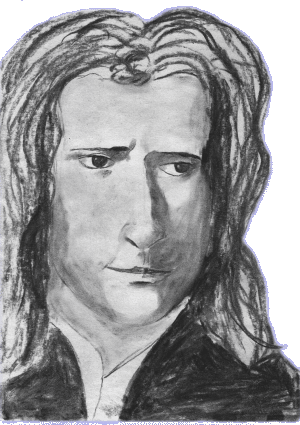
| |

Isaak Newton
Isaac Newton, who lived during the 18th century, was one of the greatest mathematicians and physists. He mainly used mathematics as a reasearching tool for astronomy and physics.
Newton was also very interested in theology, like Euler and many other mathematicans before him. He was, however, one of the last mathematicians who did his research in the name of God. And his discoveries about gravitation and the paths of the different planets around the sun, were an important reason why.
After Newton, the laws of nature became more important than the creator behind them. And through the discoveries of non-Euclidean geometries, scientists started to establish theorems, and then see how they might be useful. Many people still believe that there is one formula to describe the world. Some of the greatest scientists have spent years trying to find such a formula. Would this formula be a mathematical way to describe God?
Many of Newton's discoveries are common knowlege today, but were revolutionary in his time. For example, people still believed in the Greek idea that colors consisted of a mixture of light and shadows. This idea isn't so crazy if you think of how colors grow fainter when the sun goes down. So when Newton came with his idea that light consists of all colors mixed together, people weren't too happy. Even though anyone could have tested his experiment of breaking the light into its colors with a prism.
One of Newton's most important papers laid the foundation for calculus. Calculus is an extention of Descartes' analytic geometry. For example, with it you can calculate the area of shapes which are not enclosed with lines and parts of circles.
Even though Newton didn't publish much of his work, it was plenty to give him quite some fame. When he died, he was a rich, honored and knighted gentleman.
